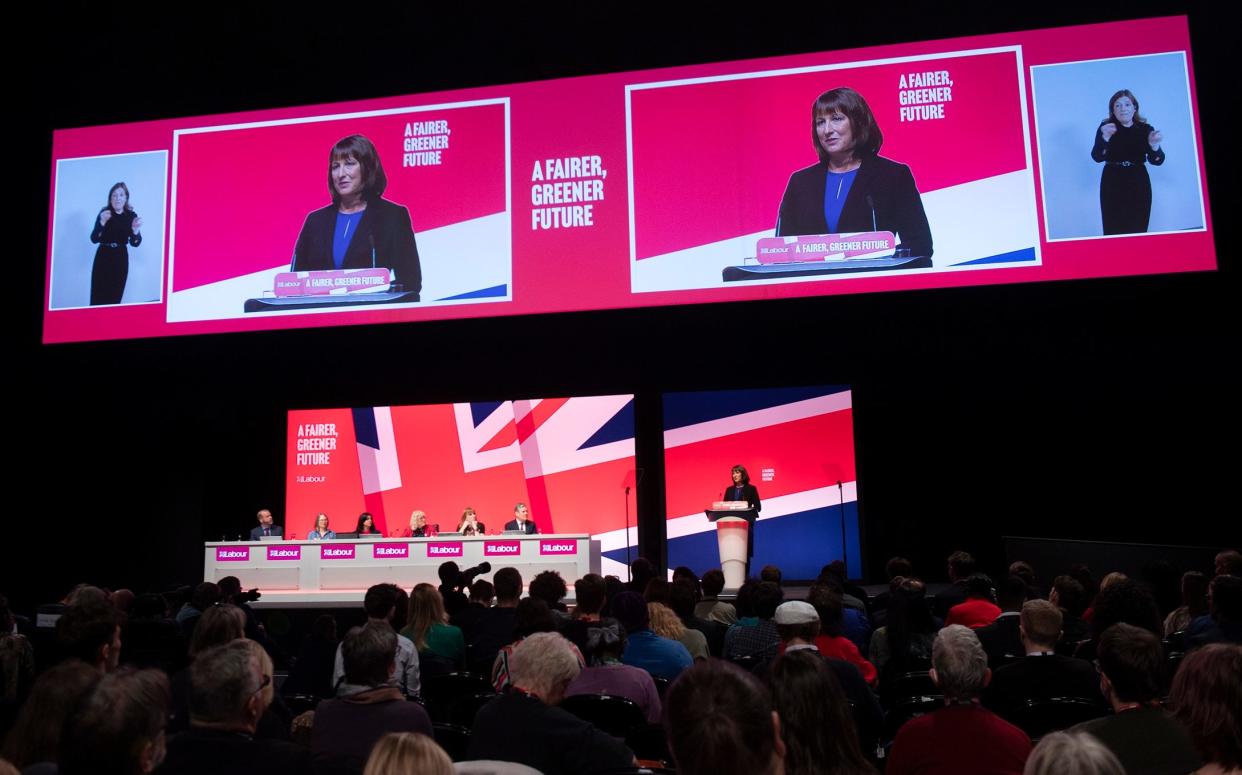Labour will revive plans to raise corporation tax, says Rachel Reeves

Labour would revive Boris Johnson’s plans to raise corporation tax to 25 per cent, Rachel Reeves said on Monday.
The shadow chancellor attacked Liz Truss’s decision to scrap the rise as “wrong” and said it would not boost investment as promised.
Speaking at the party’s conference in Liverpool, she accused the Prime Minister of being “reckless and irresponsible” with the economy.
Ms Reeves said that, while Labour supported the 1p reduction in basic income tax, it opposed the other cuts announced by the Government.
“When I talk to businesses, they don’t tell me that their priority is corporation tax,” she told delegates. “They tell me about the need for properly targeted investment allowances, the need for workers equipped with the right skills, the need for certainty and a sense of direction from government – and yes, the need for a sensible working relationship with our European neighbours.”
Labour backed plans drawn up by Rishi Sunak, the former chancellor, to raise corporation tax from 19 to 25 per cent next April. Ms Reeves previously said the Tories had now changed their mind on the policy but “we have not” because it is “not the best way to boost investment”.
The Treasury estimated in its 2021 budget that the rise would raise £11.9 billion next year, rising to £17.2 billion by 2025-26.
Jonathan Reynolds, the shadow business secretary, said other countries have higher corporation tax than the UK and attract more investment.
“For us, we don’t accept the Government’s position in terms of what they have said around what was in that mini-Budget,” he told a conference fringe event. “We don’t accept the Government’s case that the headline rate of corporation tax alone is the key driver of business investment because it hasn’t been and won’t.”
Ms Reeves also unveiled plans to use the money raised from reinstating the 45p top bracket of tax to pay for an NHS recruitment blitz.
The shadow chancellor said the move would bring in £2 billion a year, which she would deploy to fund an extra 10,000 nursing and midwifery placements.
She pledged to double both the overall number of medical students in the UK and the tally of district nurses qualifying annually and said Labour would train more than 5,000 extra health visitors, who provide advice to parents with young children.
Ms Reeves said the package represented the “biggest expansion of medical school places in British history” and would ensure the NHS had the “doctors it needs”.
There were question marks over how the extra hiring spree complied with her commitment not to make any unfunded spending commitments.
In her speech, the shadow chancellor tore into Kwasi Kwarteng, the Chancellor, for bankrolling the abolition of the 45p tax rate via borrowing but went on to suggest that Labour would pay for its NHS policy in the same way. In an apparent softening of the original line, she said it was the “scale” of the Government’s borrowing that Labour opposed.
She accused Ms Truss and Mr Kwarteng of being like “desperate gamblers in a casino” and blamed the Chancellor for “fanning the flames” of the freefalling pound by hinting that he would go further and cut more taxes in the near future.
“They’ve lost credibility, they’re losing confidence, they’re out of control,” she said, adding to cheers that Labour was now the party of economic competence.
She attacked the Tories for “a return to a trickle-down idea that has been tried, has been tested, and has failed” with tax cuts for the well-off.
Ms Reeves promised to begin work “on day one” in office to set the minimum wage “at a level that reflects the real cost of living”. She pledged to work with the Low Pay Commission to update how it is calculated, taking into account the toll of rising prices.
But sources within Labour suggested that did not necessarily mean that the minimum wage would be automatically pegged to inflation.
In a crowd-pleasing speech, Ms Reeves unveiled plans to bring union barons back into the heart of decision-making by reinstating a body wound down by Margaret Thatcher. Her pledge to reassemble the National Economic Council was seen as an olive branch to union chiefs opposed to Sir Keir Starmer’s leadership.
Senior Tories rounded on Ms Reeves over her speech and said her policies would deter investment in Britain.
Michael Fabricant, the MP for Lichfield, accused Labour of “the same old politics of envy to attract a vote or two” and said: “By not penalising the rich, wealth and jobs are attracted to the UK. She doesn’t seem to have learned that lesson. Same old Labour.”
Free market think tanks also panned the plan to involve unions in policy making. “At a time when unions are causing devastating disruptions for working people across the country, it’s astounding that Rachel Reeves would propose giving them even more power to hold us to ransom,” said Morgan Schondelmeier, of the Adam Smith Institute.

 Yahoo Movies
Yahoo Movies 
